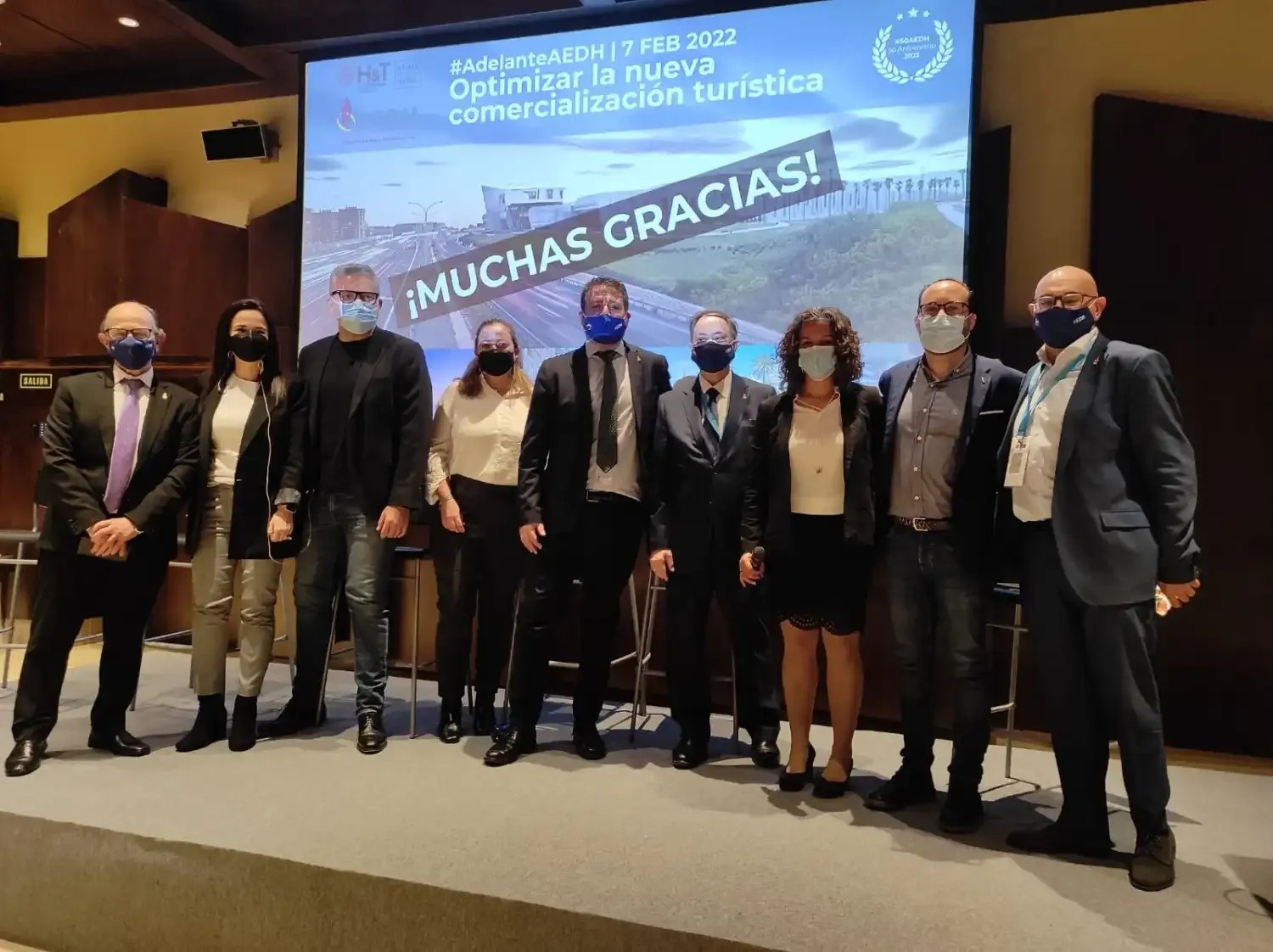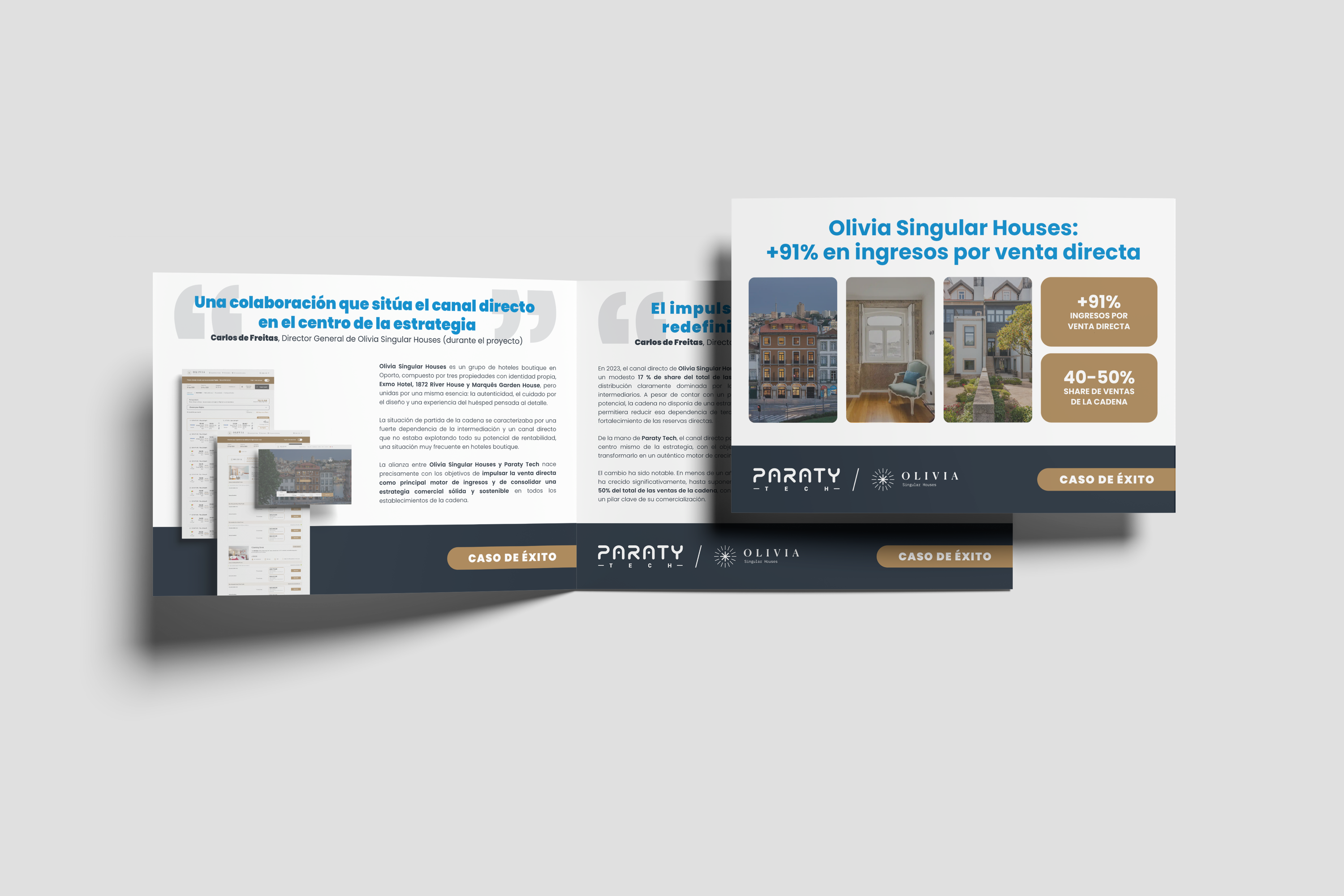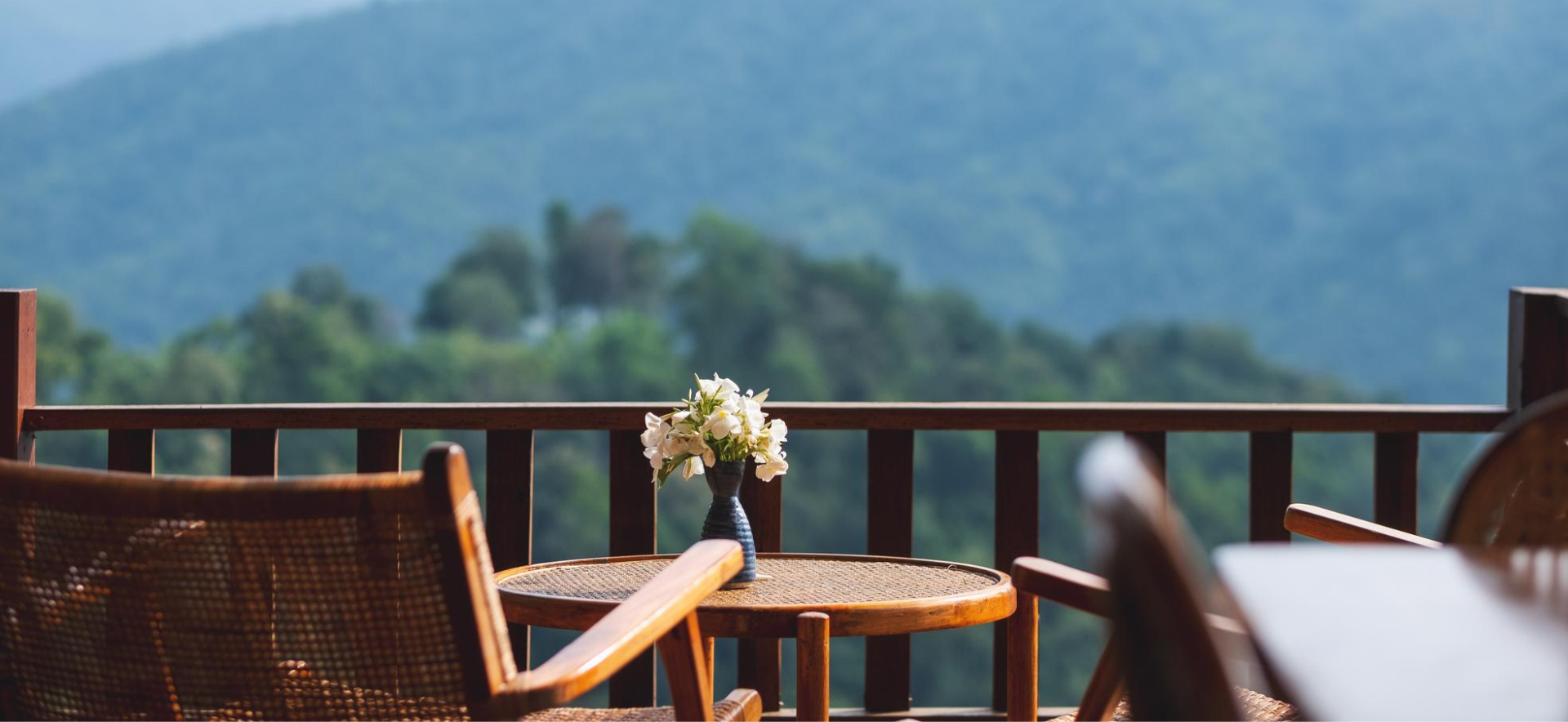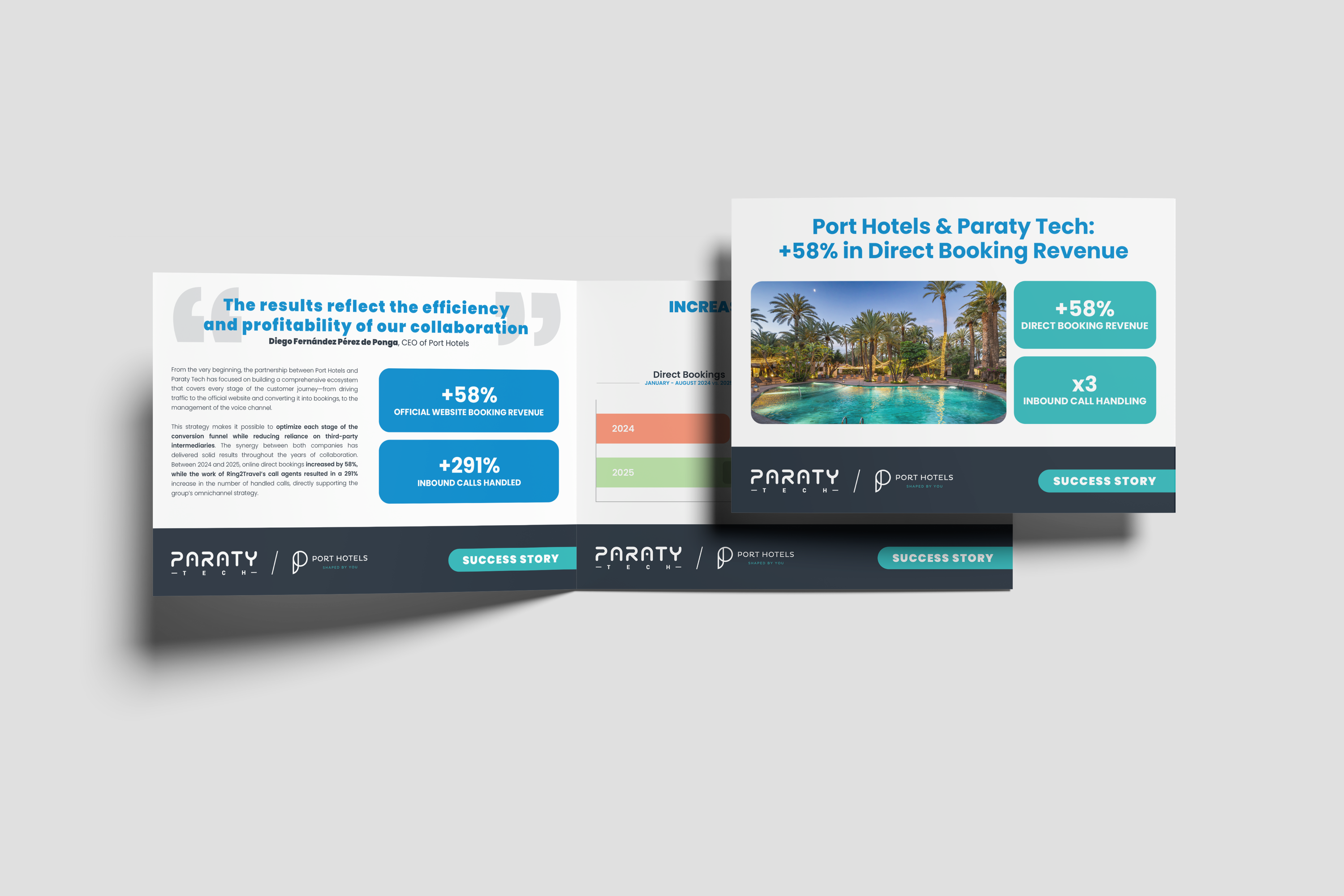«Distribution cannot forget to focus on the guest»
Events 08/02/2022Julián Alcolea, operations manager at Ring2Travel, and Cindy Johansson, project manager at Turobserver, participate in the forum “Optimizing the new tourism marketing”, organized by the AEDH within the framework of the H&T Hospitality Innovation Show”
Yesterday, February 7, the H&T Hospitality Innovation Show began which, for three days, has once again turned Fycma into a meeting point of reference at a national level for companies in the HORECA channel, the tourism industry and gastronomy. As it could not be otherwise, the AEDH Spanish Association of Hotel Directors was there, in what constituted another example of its unconditional support for hotels and the sector, in this 2022 in which, in addition, they celebrate their 50 years of activity.
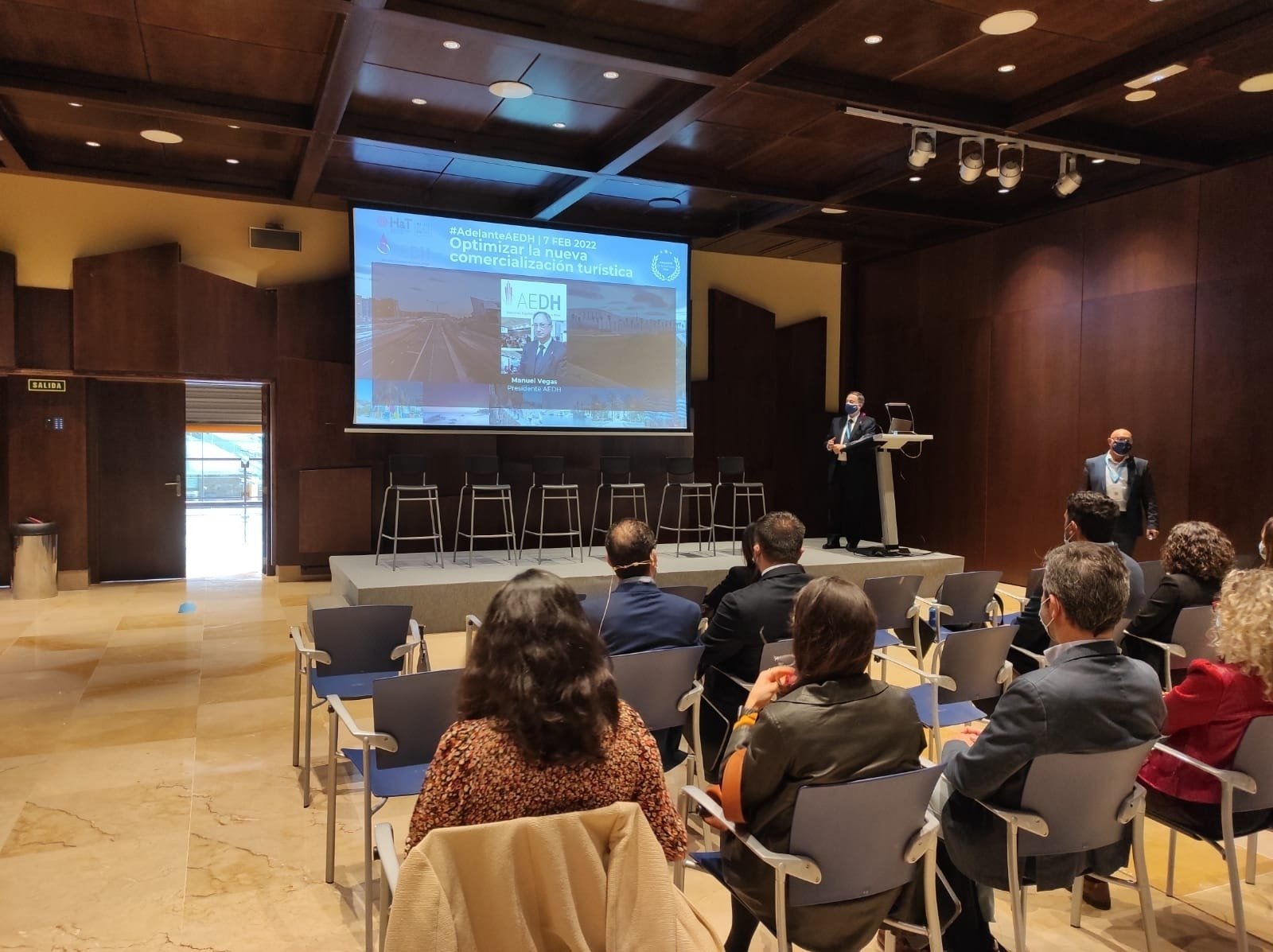
Within the complete agenda of the event, the AEDH was in charge of organizing the forum "Optimizing the new tourist commercialization", inaugurated by its president Manuel Vegas , who made a brief tour of the work of the entity, stressing the determining role that the new generations play, present and future of the association.
For his part, Isidro Tenorio Meseguer , responsible for communication and events at the AEDH, was in charge of introducing the participants of the two round tables that made up the forum program, and in which we also had the pleasure of participating, for Double match. While Julián Alcolea , operations manager of Ring2Travel , appeared on the panel of the first one as a member, in the second it was Cindy Johansson , project manager of Turobserver, who joined the poster, with Julián adopting the role of moderator on this occasion .
Table 1: Latest trends in intermediation and marketing
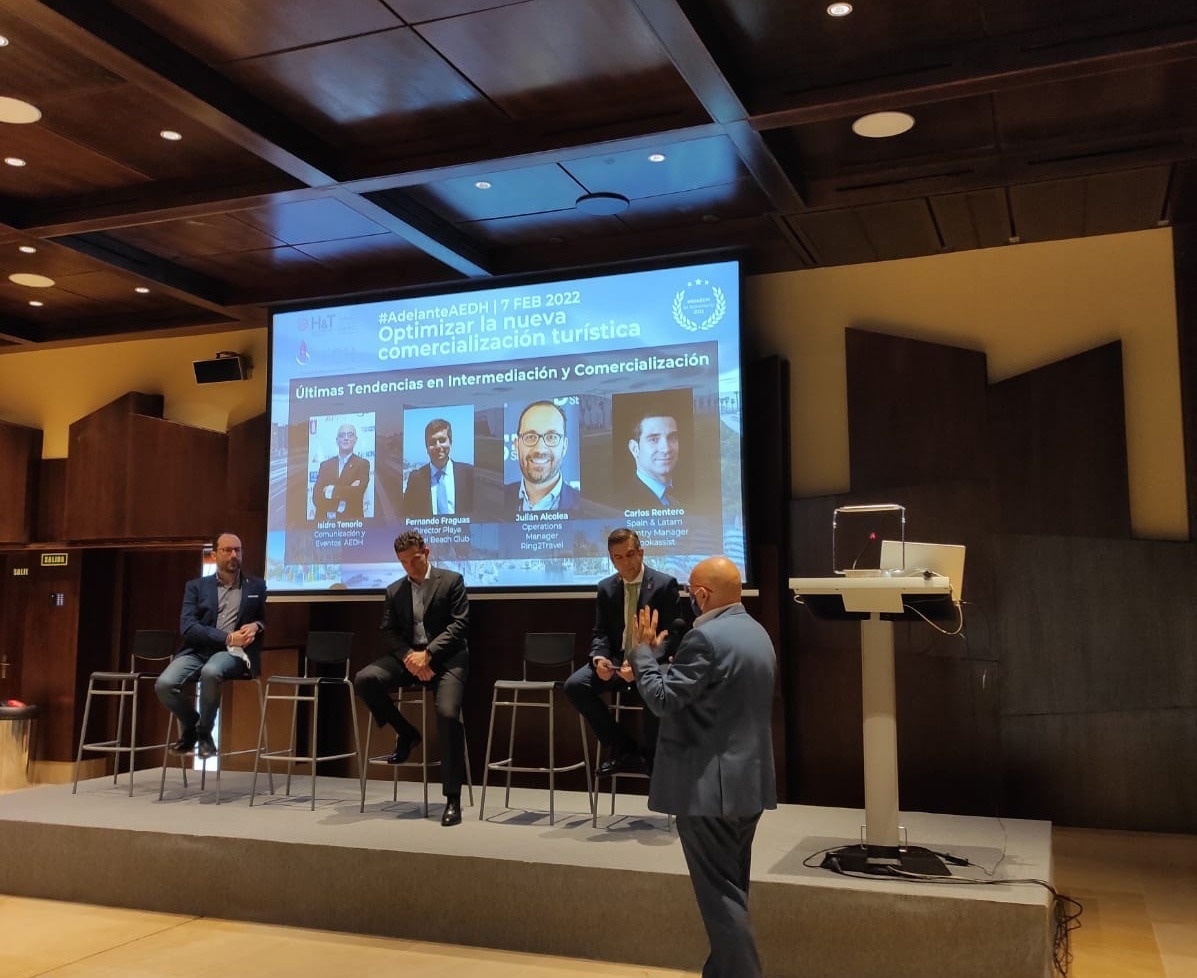
After the opening ceremony, the first table began, moderated by Isidro Tenorio , and made up of Fernando J. Fraguas , director at Playa Miguel Beach Club & Aparthotel, Julián Alcolea , operations manager at Ring2Travel, and Carlos Rentero , director of Bookassist in Spain. and Latin America.
On the agenda, the latest trends in intermediation and marketing , within a context still marked by the pandemic, in which "we are faced with a guest who increasingly demands more, who goes far beyond the stay", as Fraguas affirmed, and in which "although direct sales have grown a lot, we must not lose sight of the income statement, which is what ultimately really interests the hotelier", as Rentero pointed out. For his part, Julián added that, more than ever, "the trend is towards putting the focus where the guest is, listening" and, in this sense, he referred to the voice "as a very powerful distribution channel".
"The trend is towards putting the focus where the guest is and, in this sense, voice is a very powerful distribution channel."
Julián Alcolea, operations manager Ring2Travel
Isidro then redirected the debate towards the trends within intermediation at the technological level , and launched the following question into the air: “Are we prepared for the “increased traveler”, the new traveler profile?”. The consensus in the responses of the guests was summed up in the central idea that technology without strategy is not effective . A statement that, somehow, took us to the famous slogan of a well-known brand of tires, when it said that uncontrolled power is useless. In this sense, Rentero also expressed himself by suggesting that "despite the fact that it is true that we are living in a moment of democratization of technology, we should not allow ourselves to be closed by it, since there is no technology that can fix a bad strategy."
Totally in agreement with this statement, Alcolea asserted that "there are clients who do very well in terms of direct sales and others who do very poorly, using the same technology, and those who have been surprised by the pandemic without having defined a strategy, at least five years from now, they have had a very bad time”. What does seem clear is that, for the OTAs, clear exponents of the effective use of technology, hotels are mere suppliers of raw material and the reality is that they allocate the bulk of their resources and developments to whoever is really interested, the customer. Along these lines, the director of Playa Miguel Beach Club & Aparthotel stressed that "recognizing a customer by their last name, knowing their recent behavior and offering them exactly what they want, has great potential in terms of conversion."
All the members of the table were somewhat skeptical with what seem to be the technologies of the most immediate future , differentiating between a technological innovation and the fact that it really settles in the market. They alluded to recent examples, such as the limited number of reservations made through virtual voice assistants (such as Alexa, Google or Siri) or the arrival of cryptocurrencies as a method of payment, both of which were considered authentic technological revolutions at the time and which, for the moment, , have remained more a mere commercial claim than anything else.
However, Fernando Fraguas did sense a certain potential in augmented reality for, for example, the choice of a certain room, Rentero was convinced of the decisive role that artificial intelligence will play in increasing conversion, and Alcolea saw in Big data is the real winning bet, while he added, laughing, that “what is not going to be a trend is the robot behind a hotel reception, I don't see the human factor disappearing”. Fraguas concluded and closed the table with the following headline: “intermediation changes, but tourism prevails”.
Table 2: Innovation and technology for the new commercialization
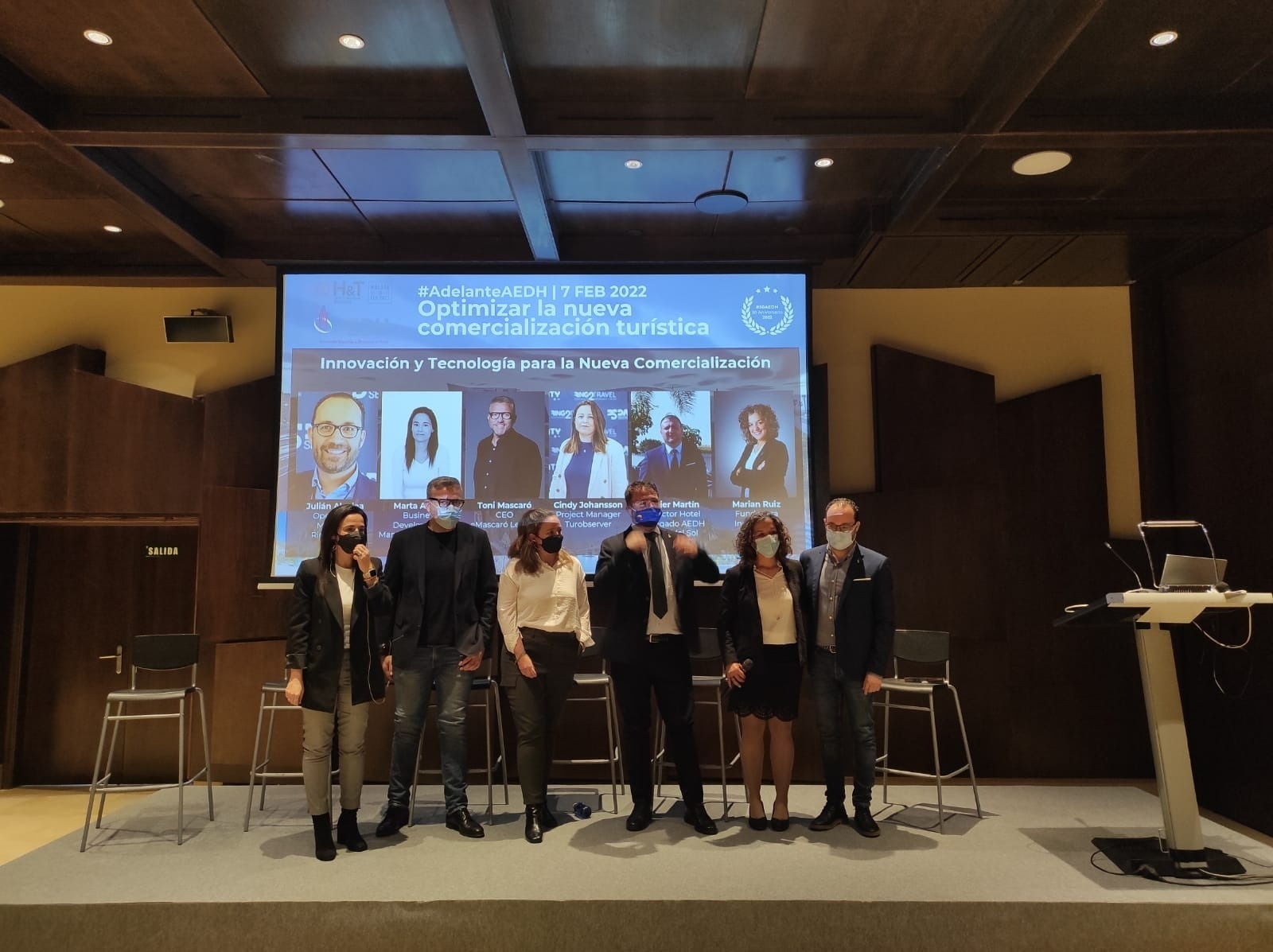
Leakage and shortage of developers, blue oceans, the importance of adapting technology to specific needs, the true definition of innovation... Many were the topics that were discussed at the second table of the day, moderated by Julián Alcolea and integrated by Cindy Johansson (Turobserver), Marian Ruiz (Incubadora Revenue), Javier Martín (AEDH), Toni Mascaró (e-Mascaró) and Marta Anego (Profitroom), who opened with a delicate question: Is it difficult to make hoteliers understand the need for innovation?
"They have wanted to sell the motorcycle many times to the hotelier," said Toni, who qualified that "you have to see what innovation really is, a concept that goes far beyond having a website and a CRM, present in all processes... there are to bet on the talent that executes it”. Johansson claimed to often run into "people who come to see big data as a complication." Hence the challenge of “knowing how to identify who we are dealing with and being able to adapt the technology to the point of being able to clearly convey the way in which it will improve their day-to-day management”. Something in which, according to Marian Ruiz, the degree of technological maturity of the hotelier greatly influences: "many times the hotelier has the website he deserves... if he is not mature, we will not be able to convince him, because it depends a lot on what he understands by necessity, and it is important to assimilate that digitization does not come to replace people, but rather monotonous jobs”.
"The challenge is knowing how to identify who we are dealing with and being able to adapt the technology to the point of being able to clearly convey the way in which it will improve day-to-day, management, etc."
Cindy Johansson, Turobserver project manager
An idea with which Javier Martín agreed, adding that "technology should not eradicate professions, but reconvert them to offer a better guest experience" and that, in this sense, "innovation is already part of the hotel's action plan" .
When asked about the most widely implemented technological innovation in distribution today , Marta Anego was clear: "Everything related to the direct channel, without a doubt, which is the one that is really adding value to the market." For his part, Mascaró was referring to machine learning, convinced that very soon “we will talk to a machine without knowing it, for example, in call centers”. In any case, the crux of the matter, he added, "is in strategic innovation, technology may take one or five years, but it will eventually arrive."
Once again, the strategy made an appearance , and statements such as the one that defends that "technology without control is useless" were repeated. These were the words of Cindy, who referred to big data as "the true revolution", but insisted on the fact that, sometimes, "not everything works for everyone... there are those who feel comfortable with your sophisticated cloud platform and its thousands of of KPIs, and there are those who value a simple PDF report much more, easy to share, which also saves time and headaches, summarizing the key ideas and proposing specific lines of action... Keep data simple... The content is the same, what changes is the continent”, he concluded.
The debate progressed and the idea that "innovation is already the base" and that the key now lies in "differentiating oneself, in being disruptive" was becoming more and more established, as Martín said. In any case, in the words of Marian Ruiz, "there is no single answer to this question, a specific innovation cannot be singled out, it is rather the sum of many of them, there are many variables that influence". And he was referring, as an example, to the way in which a rate shopper with whom he has recently started working, a solution that has been widely implemented for decades in the day-to-day life of revenue managers, continues to save days of work with just a couple of clicks .
Perhaps, therefore, it is not a question of constantly striving to invent, but of finding the most appropriate use , because as Toni said, "blue oceans no longer exist, only little puddles... we must avoid continuing to dedicate efforts to identifying them, when in reality everything is as simple as seeing what works and implementing it, even improving it”.
Julián Alcolea invited them, then, to move to the future , specifically to imagine where we will be in eight years, in 2030. Cindy aroused a smile in the audience when she wondered "if there will ever be a time when family or friends will not have to Call for a hotel recommendation. Mascaró spoke more of a question of "attitude than aptitude", referring to the fact that "machine learning and robots will be there, but the important thing is the talent of the professionals... in 10 years, whoever doesn't work will stay outside… when the tide goes down, we will see who is not wearing a swimsuit”. For her part, Marta Anego spoke of "a change in the consumption model", referring to "personalization" as a fundamental key.
The last point of the debate focused on the comparison between the big technology companies, the OTAs, and us, the hotels . While Mascaró once again alluded to the brain drain that is taking place in small companies, defining it as “the great resignation”, Javier Martín raised and answered the following question: “who really has the power? We have the power to differentiate ourselves.”











